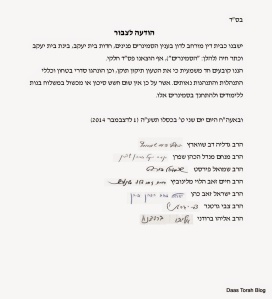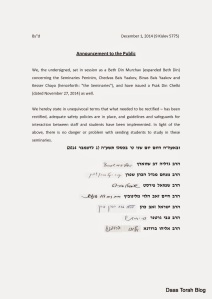 |
| Meisels |
Of course they don't say it out right, just read the psak, and you will conclude as I did that the headline is correct, and not misleading ......
But I have to give credit where credit is due .... the Bais Din did acknowledge that abuse took place, but they decided to protect the enablers!
If you need further clarification and pshat in the psak ....
read the great commentary from FRUMFOLLIES, he has a great take on this outrageous conclusion!
Psak translation from Frumfollies:
The eve before Wednesday, 5 Adar, 5775 (March 10, 2015)
The Expanded Beis Din With These Rabbis
- Rabbi Gedalia Dov Schwartz
- Rabbi Shmuel Feurst
- Rabbi Yisroel Zev Hacohen Cohen- These three [above] are from Chicago, USA henceforth [referred to as] the Chicago Beis Din [aka CBD]
- Rabbi Menachem Mendel Hacohen Shafran
- Rabbi Chaim Zev ben R. Avrohom Aharon Halevi Malinowitz
- Rabbi Tzvi Gartner- These three [above] are from Eretz Yisroel [Israel] henceforth [referred to as] the Eretz Yisroel Beis Din [aka IBD]
- Rabbi Eliyahu Brudney from Brooklyn, New York
We sat as an expanded beis din (rabbinical court) to judge the issue of the seminaries: Pninim, Chedvas Beis Yaakov, Binas Beis Yaakov, and Keser Chaya – henceforth referred to as “the seminaries”. This psak din (ruling) is the continuation of the partial psak din that was rendered on Monday, 9 Kislev 5775 (December 1, 2014), and these [two rulings] should be understood as a unit.
In this part of the psak din, we address the question of the responsibility of the administrators in what occurred:
- Did they know anything at the time of the events or should they have known?
- Included in this is the issue of the general atmosphere in the seminaries; was there an atmosphere of frivolity that invited abuse? Did they contribute knowingly or unknowingly to the creation of such an atmosphere? Or/and did they fail in creating a proper atmosphere?
- Similarly, when incidents became known regarding the previous year, did the administrators act properly in the relevant spheres?
Our deliberations led to the following Psak Din (Ruling)
A. Keser Chaya Seminary [Mrs. Shulamis Soloff]: No complaint of unacceptable or prohibited action against the offender/abuser [Elimelech Meisels] was received with regard to this seminary. While there were complaints of inappropriate, improper, and abnormal behavior (the type described in the Reasons of the psak din of Rav M.M. HaKohen Shafran, from here on to be referred to as briefly as “Reasons”), the administrators dealt with those incidents immediately, with efficiency and expertise. We decisively say: there was not and is not any reason in the world to raise questions regarding this wonderful; seminary or its administration. This decision should repair any mistaken impression that could confuse others created in the past.
B. Pninim Seminary [Rabbi Boruch Dovid Simon]: Adjudicating this case is superfluous. This is because the administrator at the time of these acts was the offender/abuser himself [Elimelech Meisels]. The current administration was promoted from among the staff as a result of the offender/abuser’s resigning/firing.
As such, one cannot complain about the current administration because of the acts of the previous administration – run by the offender/abuser – and they bear no responsibility, even administratively, for his [Meisel’s] actions.
It should also be noted what was written in note 7 of the partial psak din: “The beis dinwas deeply impressed from the staff of the seminaries, their dedication and concern, their outlook and fear of God, and their being fit to educate bnos yisroel (Jewish daughters) in Torah and fear of heaven and to establish faithful homes in Israel.” These words that were said generally are certainly applicable to the [current] administration of Pninim Seminary.
C. Chedvas Beis Yaakov Seminary [Rabbi Meir Kahane]: Here, we also received no complaints about unacceptable or forbidden behavior by the offender/abuser, only inappropriate, and abnormal behavior, (the type of behavior described in the “Reasons” document.) But, unlike the situation in Keser Chaya, a complaint and claim was placed against them as if the administrator’s response was too conciliatory and inadequate, and perhaps even worse (for details, see the “Reasons” document.)
Also, an email was shown to us that was sent from the administrator about the incident. The email was sent to a group of former students, after the incident blew up and became publicized. It was claimed that this email was at worst an attempt to hide or obscure things (cover-up in English), and at best, insensitive to the situation of the victims.
And so, after careful examination and after pitting the administrator against the witness who testified about the abnormal behavior of the attacker and the inappropriate response of the administrator, we reached the following decision: We heard the explanation of the administrator. Although it would appear that his response cannot be characterized as wise or insightful, but from there to placing a stain and suspicion on a dedicated administrator whose reputation precedes him—who could suggest such a thing?! We will leave it at that.
Regarding the email: the administrator explained his pure intentions – giving strength and encouragement, in what was meant to be a closed forum, to former students who were bewildered and confused about the magnitude of the incident and the public reaction to it. According to him, the initiative for this came from students who asked him for words of encouragement on the topic.
Again, one can debate the judgment of the administrator and his timing. Similarly, he should have known there are no secrets; things said—and certainly written—in a closed forum with many participants are susceptible to being leaked. But in the end, there was no attempt here to hide or obfuscate the facts or be insensitive to the victims.
As such, and taking into account the fact that the administrator expressed before us his true regret for the words that he penned, which might not have been proper, and taking into account his great suffering and the publicizing of him in a bad light recently, we establish that he has already had his just deserts, and there is no further reason to doubt or question—God forbid!—his good name and fitness for educating the young women to Torah and knowledge.
D. Binas Beis Yaakov Seminary [Mrs. Hindy Ullman]: here the issue is more complex, and we will go in order.
1. Did the administration know in real time what was going on under their auspices: The beis din is convinced that until the day the story became known towards the end of last year, the seminary’s administration knew nothing about the offender/abuser’s actions. All the “proofs” submitted before the beis din suggesting they knew this or the other detail, can only be considered speculative and imagination. They do not conform with the reality on the ground, or with the personality of the administration.
2. The administration’s response when the incident became known: The chain of events is detailed extensively in the “Reasons” document. It is clear that once it became known, the administration acted quickly, with determination, and with great efficiency to investigate what occurred. This led to the removal of the offender/abuser from the physical environment (by immediately sending him abroad) and from continuing in the field of education – for these actions the administration is worthy of great praise. {see footnote 1}
3. Regarding the behavior of the administration toward the parents of the victim, and to witness “5”: see the “Reasons” document, and the matter is clear.
4. Regarding the question of the general atmosphere in this seminary, if it was an atmosphere of frivolity, inviting such incidents: the answer is a decisive no. See “Reasons” for more on this at length.
5. Regarding the question of whether the administration should have known sooner what was going on under their auspices: here we are perplexed, and we will go into more detail in order to explain.
As stated in the partial psak din and in the “Reasons,” the offender/abuser himself is not a part of these proceedings. Further, many of those who were meant to know what was going on in the seminary at the time have refused to testify before the beis din. Despite that, the picture that has emerged thus far (based mainly on the written admission of the offender/abuser and supported by a number of testimonies) is as such:
We are talking about incidents that occurred during the schools years of 5770-5774 [Fall ’09- Summer ‘14]. Incidents before that period are not known. The incidents happened in the first years of Pninim, and from 5772 (the year Binas Beis Yaakov opened) and on, specifically in Binas. {see footnote 2} We are talking about a handful of incidents each year. {See footnote 3}
After going through the material before us, it is difficult to shake the feeling that there were red flags and troubling signs, and the administration should have known and sensed what was going on under its own nose. {See Footnote 4} Indeed, it is difficult to establish that with certainty, and even if you say it is true, how can we know and decide if it was at the level of negligence or near negligence, or less than that – but to leave it at nothing is impossible.
On the other hand, one must take into account the great suffering by the administration in recent months with the publication putting them in a bad light, along with their praiseworthy response once the matter became known, as described in section 2.
Therefore it seems that we must make do with the continuation of the arrangements that were agreed upon by the administration in Kislev of this year. According to [these arrangements], some of the positions and responsibility will be transferred temporarily to another party. As well, supervision and guidance by Mrs. Birnbaum will be increased. These arrangements will be in effect until the start of the school year of 5777 [Fall 2016].
E. In part 2, paragraph 1 of the partial psak din it is written: first, and foremost, the beis din Eretz Yisroel dealt with the removal of the offender/abuser and his family from all administrative positions in the seminaries, and brought about their being removed from the amuta [Israeli not-for-profit corporation], and the transferring of responsibility to other people. The situation today is that the amuta and all the institutions under its umbrella are being transferred to the faithful hands of a group of Haredi activists who arebnei torah, who will be completely subservient to the instructions of the expanded beis din, and above them the great rabbis and teachers, the elders of the roshei yeshivos of the USA.
Practically, the issues have been drawn out and have yet to come to a resolution. The beis din is convinced that the situation will be resolved in the best way possible, and is giving it more time, until July 1, 2015. The beis din will continue to follow developments and if necessary will sit again on this issue.
F. As a side note on the matter: it is no secret that over the entire period of the case thebattei din (Eretz Yisroel and Chicago) acted separately. If we did act jointly, this is as a result of the efforts of three people who wish to remain anonymous, from Chicago, who have worked tirelessly for the success of the unification, and under the authority of Rabbi Avrohom Chaim Levin, Rosh Yeshiva of Telshe Yeshiva-Chicago and member of the Moetzes Gedolei Hatorah of Agudah [Council of Torah Sages of Agudath Israel of America], they should be blessed from heaven with all good. And to the Rosh Yeshiva it is said: “Days onto the days of the king may you add, etc.”[Psalms/Tehillim 61:7], and together we should merit to greet the righteous redeemer, speedily in our day, amen. (Footnote 5)
We came to sign on the eve before Wednesday, 20 Adar, 5775 (March 10, 2015) {See footnote 5}
- Rabbi Gedalia Dov Schwartz
- Rabbi Menachem Mendel Hacohen Shafran- (I published my view as part of the minority opinion, and here I join my voice to that of the majority with regards to the practical outcome.)
- Rabbi Shmuel Feurst
- Rabbi Chaim Zev ben R. Avrohom Aharon Halevi Malinowitz (My opinion, in the full sense of the word, is like that of R. Shafran, and my view is also like that of the minority, but here I sign to join with the majority as it regards halacha and the practical outcome.)
- Rabbi Yisroel Zev Hacohen Cohen
- Rabbi Tzvi Gartner
- Rabbi Eliyahu Brudney
Footnotes:
- It should be stressed a document was presented to the beis din seemingly proving that at least one member of the beis din knew about the actions of the administration while it was happening.
- [redacted to protect identity of victims and to comply with court order barring publicizing their identities by name or other unique information]
- And so the rumors of tens of victims each year have no basis or foundation in reality
- Though, in reality, she didn’t know
- The minority view, of Rabbis Schwartz, Feurst and Cohen – on one side, and Rabbis Shafran and Malinowitz and the other side, as well as the explanations of the majority, will be publicized separately.






